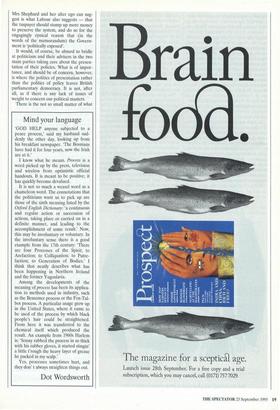Mind your language
`GOD HELP anyone subjected to a peace process,' said my husband sud- denly the other day, looking up from his breakfast newspaper. 'The Bosnians have had it for four years, now the Irish are at it.'
I know what he means. Process is a word picked up by the press, television and wireless from optimistic official handouts. It is meant to be positive; it has quickly become devalued.
It is not so much a weasel word as a chameleon word. The connotations that the politicians want us to pick up arc those of the sixth meaning listed by the Oxford English Dictionary: 'a continuous and regular action or succession of actions, taking place or carried on in a definite manner, and leading to the accomplishment of some result.' Now, this may be involuntary or voluntary. In the involuntary sense there is a good example from the 17th century: 'There are four Processes of the Spirit; to Arefaction; to Colliquation; to Putre- faction; to Generation of Bodies.' I think that neatly describes what has been happening in Northern Ireland and the former Yugoslavia.
Among the developments of the meaning of process has been its applica- tion to methods used in industry, such as the Bessemer process or the Fox-Tal- bot process. A particular usage grew up in the United States, where it came to be used of the process by which black people's hair could be straightened. From here it was transferred to the chemical itself which produced the result. An example from 1960s Harlem is: 'Sonny rubbed the process in so thick with his rubber gloves, it started stingin' a little t'rough the heavy layer of grease he packed in my scalp.'
Yes, processes sometimes hurt, and they don' t always straighten things out.
Dot Wordsworth


































































 Previous page
Previous page